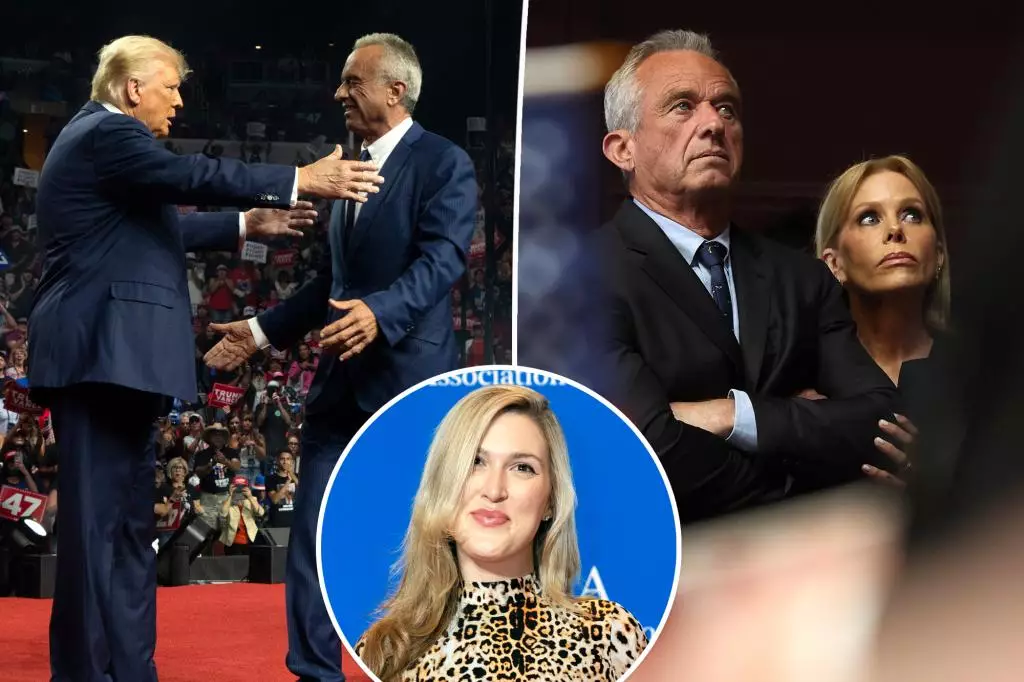In the world of politics, personal controversies often appear to be a footnote rather than a full stop to one’s career ambitions. The emergence of Robert F. Kennedy Jr.’s alleged romantic entanglements has underscored this reality, especially within the context of the Trump administration’s ongoing evolution. As allegations surface regarding Kennedy’s alleged affairs, insiders suggest that such controversies may not impede his prospects but could, in fact, bolster his standing within certain political circles.
Recent reports reveal that three women have accused Kennedy of engaging in romantic relationships while navigating his political ambitions. This comes on the heels of his scandalous digital affair with Olivia Nuzzi, a star reporter for New York Magazine. The relationship, which reportedly included intimate communications but lacked physical encounters, raises eyebrows in both the media and political arenas. Kennedy’s public denial further complicates matters, with discussions of potential legal action against Nuzzi emerging, suggesting a defensive posture from those close to him.
Despite the uproar, sources within GOP circles express nonchalance about Kennedy’s reported indiscretions. In fact, some suggest that the environment in contemporary Washington, D.C., has shifted dramatically from the days of strict moral policing associated with past political figures. One insider pointedly remarked that “people don’t care” about personal life dramas anymore, emphasizing a new era where the political focus prioritizes electoral success over individual moral scrutiny.
President Donald Trump, known for his own tumultuous relationship with allegations of infidelity, appears to adopt a pragmatic approach to Kennedy’s situation. Sources indicate that his main concern lies in assembling a competent administration rather than scrutinizing the private lives of potential appointees. This perspective is telling; it highlights a strategic focus on results rather than moral judgment. The message to Kennedy seems to be that as long as he can contribute to the overarching goal of winning elections, his past might have little bearing on his future opportunities.
However, this raises important questions about the extent to which personal conduct influences political careers. While some argue that indiscretions should be overlooked in favor of political acumen and alignment with party objectives, critics would argue that a leader’s character should reflect the values they promote publicly. The divide underscores the complexities of contemporary GOP dynamics, where personal behavior may clash with political strategy.
Kennedy’s alleged affairs could pose risks to his security clearances and political viability, but that doesn’t seem to deter seasoned political insiders. They assert that there are plenty of roles within a potential Trump administration that wouldn’t necessitate high-level security, particularly in health-related positions where Kennedy has expressed interest. This adaptability reveals the intricate relationship between personal conduct and professional opportunity, illustrating that while scandal can adversely affect some politicians, for others, it might serve as a certain type of currency within a party increasingly characterized by a more liberal approach to personal morality.
Moreover, as the media uncovers layers of Kennedy’s alleged escapades, contrasting narratives begin to take shape, with some highlighting Trump’s historical connections to similar allegations of misconduct. This parallel raises broader questions about hypocrisy and the standards applied to different political figures within the same party versus the standards applied to opponents.
As the story develops, the ramifications for Kennedy and his family, particularly with his wife Cheryl Hines reportedly feeling aggrieved by both his romantic pursuits and political endorsements, are poignant areas of observation. The strains between personal and public life are palpable as they navigate the potential fallout from these allegations.
Robert F. Kennedy Jr.’s situation encapsulates a crucial moment in American political culture, where personal scandals are often weighed against political efficacy. While many wonder if such controversies can hinder ambitions, the prevailing sentiment suggests that, in the contemporary landscape, being linked to political machinations may be more advantageous than detrimental. As the dynamics of personal scandal and political ambition collide, the evolving narrative offers a compelling glimpse into the ever-shifting priorities of modern governance.
